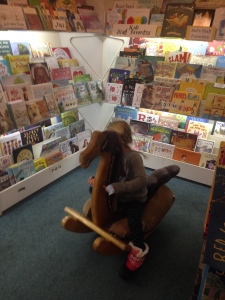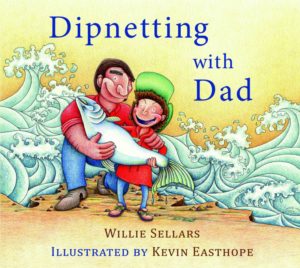 When I was teaching grade school full time, both on the reservation and off, this is exactly the sort of picture book I wanted–a contemporary slice-of-life story about a First Nations family celebrating something important to their culture. I’m particularly exited because this story comes from the salmon fishing peoples of the Pacific Northwest. Author Willie Sellers spins a lively tale of a boy’s first salmon catch using a playful and breezy tone but still conveying many important cultural details, such as preparing for the salmon fishing trip by praying in the sweat lodge and offering tobacco to the Creator. He captures the boy’s nervousness about the steep trail and swift waters of the river. He demonstrates the many steps in preparing dried salmon, with clarity and good humor. Willie Sellars is a T’exelc–a member of the Williams Lake Indian Band. He is a life long fisherman and perhaps what I love the most about this book is the way he conveys the warmth and humor of this family in his story.
When I was teaching grade school full time, both on the reservation and off, this is exactly the sort of picture book I wanted–a contemporary slice-of-life story about a First Nations family celebrating something important to their culture. I’m particularly exited because this story comes from the salmon fishing peoples of the Pacific Northwest. Author Willie Sellers spins a lively tale of a boy’s first salmon catch using a playful and breezy tone but still conveying many important cultural details, such as preparing for the salmon fishing trip by praying in the sweat lodge and offering tobacco to the Creator. He captures the boy’s nervousness about the steep trail and swift waters of the river. He demonstrates the many steps in preparing dried salmon, with clarity and good humor. Willie Sellars is a T’exelc–a member of the Williams Lake Indian Band. He is a life long fisherman and perhaps what I love the most about this book is the way he conveys the warmth and humor of this family in his story.
The illustrator Kevin Easthope is also from Williams Lake, BC. His illustrations are fresh and fun and colorful. They do a great job of putting the reader in the thick of the action whether it’s climbing the steep riverbanks, reaching over the water with a dipnet or running way from Grandma.
I would heartily recommend this book to any one working with grade school students or anyone interested in the culture of the Pacific Northwest. There is a teachers guide for this book and a free coloring page from the publisher. If you’d like to hear the author and illustrator talking about the collaboration, here’s a you tube of them with some great footage of actual dipnet fishing. This book’s Canadian publisher is Caitlin Press. It has been endorsed by the Tk’emlúps Chief Shane Gottfriedson and noted author and Xat’sull Chief Bev Sellers.

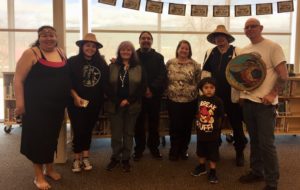
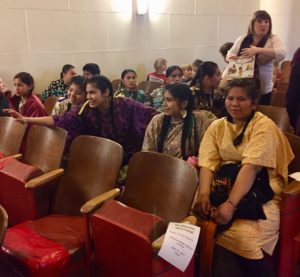
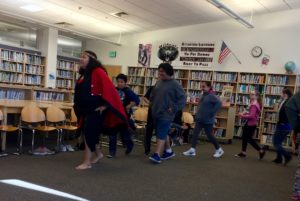 A lot of the work of being an author is the dull and dry sitting at a desk (even when that desk is in a tree) and writing day after day. But every now and then an event comes along that you know you’ll remember forever. The American Indian Cultural Festival in The Dalles last week was just such a moment. It was a celebration of literature and poetry and music and dance. It involved a group of books that I admire and authors I feel honored to share the stage with: Elizabeth Woody, Oregon’s Poet Laureate, Craig Lesley, acclaimed author of contemporary western literature, and National Book Award winning writer Sherman Alexie.
A lot of the work of being an author is the dull and dry sitting at a desk (even when that desk is in a tree) and writing day after day. But every now and then an event comes along that you know you’ll remember forever. The American Indian Cultural Festival in The Dalles last week was just such a moment. It was a celebration of literature and poetry and music and dance. It involved a group of books that I admire and authors I feel honored to share the stage with: Elizabeth Woody, Oregon’s Poet Laureate, Craig Lesley, acclaimed author of contemporary western literature, and National Book Award winning writer Sherman Alexie.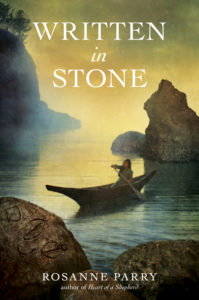 conjunction with the great booksellers at Oregon’s oldest bookstore Klindt’s who sold all the books and hosted many of the events. Tina Ontiveros is the manager at Klindt’s and Joaquin Perez is the owner. The fundraising for this event was truly a community affair with donations coming from area schools and libraries, educational foundations, local congregations, Oregon’s poet laureate program, the Wasco County Cultural Trust, the Ford Foundation, the Meyer Memorial Trust, and the Confederated Tribes of the Grande Ronde. It’s inspiring to see so many community members come together in support of literacy and the cultural understanding of our local American Indian communities. Thank you!
conjunction with the great booksellers at Oregon’s oldest bookstore Klindt’s who sold all the books and hosted many of the events. Tina Ontiveros is the manager at Klindt’s and Joaquin Perez is the owner. The fundraising for this event was truly a community affair with donations coming from area schools and libraries, educational foundations, local congregations, Oregon’s poet laureate program, the Wasco County Cultural Trust, the Ford Foundation, the Meyer Memorial Trust, and the Confederated Tribes of the Grande Ronde. It’s inspiring to see so many community members come together in support of literacy and the cultural understanding of our local American Indian communities. Thank you!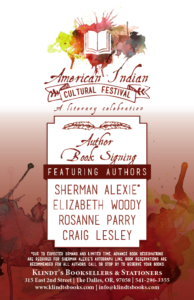 I am beyond thrilled to be included in the American Indian Cultural Festival held this week in The Dalles. I will be appearing alongside Sherman Alexie, Elizabeth Woody, the poet laureate of Oregon, and adult writer, Craig Leslie. We will be doing a poetry reading which is free and open to the public on Thursday April 13th at 4:00 in The Dalles Middle School Commons. There will be live music and a drum and dance group from the Quinault Nation. Each of the authors will read a new poem. If you happen to be in the area, I’d love to see you there.
I am beyond thrilled to be included in the American Indian Cultural Festival held this week in The Dalles. I will be appearing alongside Sherman Alexie, Elizabeth Woody, the poet laureate of Oregon, and adult writer, Craig Leslie. We will be doing a poetry reading which is free and open to the public on Thursday April 13th at 4:00 in The Dalles Middle School Commons. There will be live music and a drum and dance group from the Quinault Nation. Each of the authors will read a new poem. If you happen to be in the area, I’d love to see you there. In addition to the poetry event I will be attending a talk by Sherman Alexie at The Dalles High School. Hundreds of children will come in on busses from all over the county to hear him read from Thunder Boy Jr. which was illustrated by the amazing Yuyi Morales. This event will include drummers and dancers from the Quinault nation.
In addition to the poetry event I will be attending a talk by Sherman Alexie at The Dalles High School. Hundreds of children will come in on busses from all over the county to hear him read from Thunder Boy Jr. which was illustrated by the amazing Yuyi Morales. This event will include drummers and dancers from the Quinault nation. What an interesting year to work in a book store! Annie Blooms is in a neighborhood with the largest Jewish community in Oregon and also a sizable immigrant African population. Here’s what I’ve found uplifting in a year full of ugly politics. Time and again, readers came in looking for a book that would help them make sense of their opponent’s point of view.
What an interesting year to work in a book store! Annie Blooms is in a neighborhood with the largest Jewish community in Oregon and also a sizable immigrant African population. Here’s what I’ve found uplifting in a year full of ugly politics. Time and again, readers came in looking for a book that would help them make sense of their opponent’s point of view. The conservative who just doesn’t understand what black people are so upset about, was willing to walk out of the shop with Between the World and Me by Ta-Nehisi Coates. Willing to look into it. Eager, in fact, to understand better.
The conservative who just doesn’t understand what black people are so upset about, was willing to walk out of the shop with Between the World and Me by Ta-Nehisi Coates. Willing to look into it. Eager, in fact, to understand better. “How can a bunch of white men feel so discriminated against,” say the bookclub ladies. “Where on earth can all these Trump supporters be coming from?” I don’t know either but these earnest bookclub members are searching for insight and talking about what they find.
“How can a bunch of white men feel so discriminated against,” say the bookclub ladies. “Where on earth can all these Trump supporters be coming from?” I don’t know either but these earnest bookclub members are searching for insight and talking about what they find. Nearly everybody who comes into the shop talking about some crisis or other, the Standing Rock Sioux and the oil pipeline or the tide of refugees fleeing into Europe, has an opinion to start with. But here’s the cool part; they know they need to know more. They know that what is online masquerading as news is often not reliable. They already know what they think, but they want to know what the other guy thinks. They want to know the context, the history, the back story, the supporting science. And very often they want to know how to talk about these issues with their children. And yes, there are books for that!
Nearly everybody who comes into the shop talking about some crisis or other, the Standing Rock Sioux and the oil pipeline or the tide of refugees fleeing into Europe, has an opinion to start with. But here’s the cool part; they know they need to know more. They know that what is online masquerading as news is often not reliable. They already know what they think, but they want to know what the other guy thinks. They want to know the context, the history, the back story, the supporting science. And very often they want to know how to talk about these issues with their children. And yes, there are books for that! 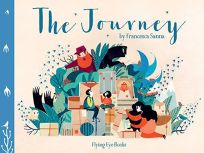

 f a hot chocolate date and settles in the picture book section to sip cocoa and read aloud to each other. I think of Annie Blooms as a warm and welcoming place. But I had an experience over the summer that has me rethinking my assumptions.
f a hot chocolate date and settles in the picture book section to sip cocoa and read aloud to each other. I think of Annie Blooms as a warm and welcoming place. But I had an experience over the summer that has me rethinking my assumptions.